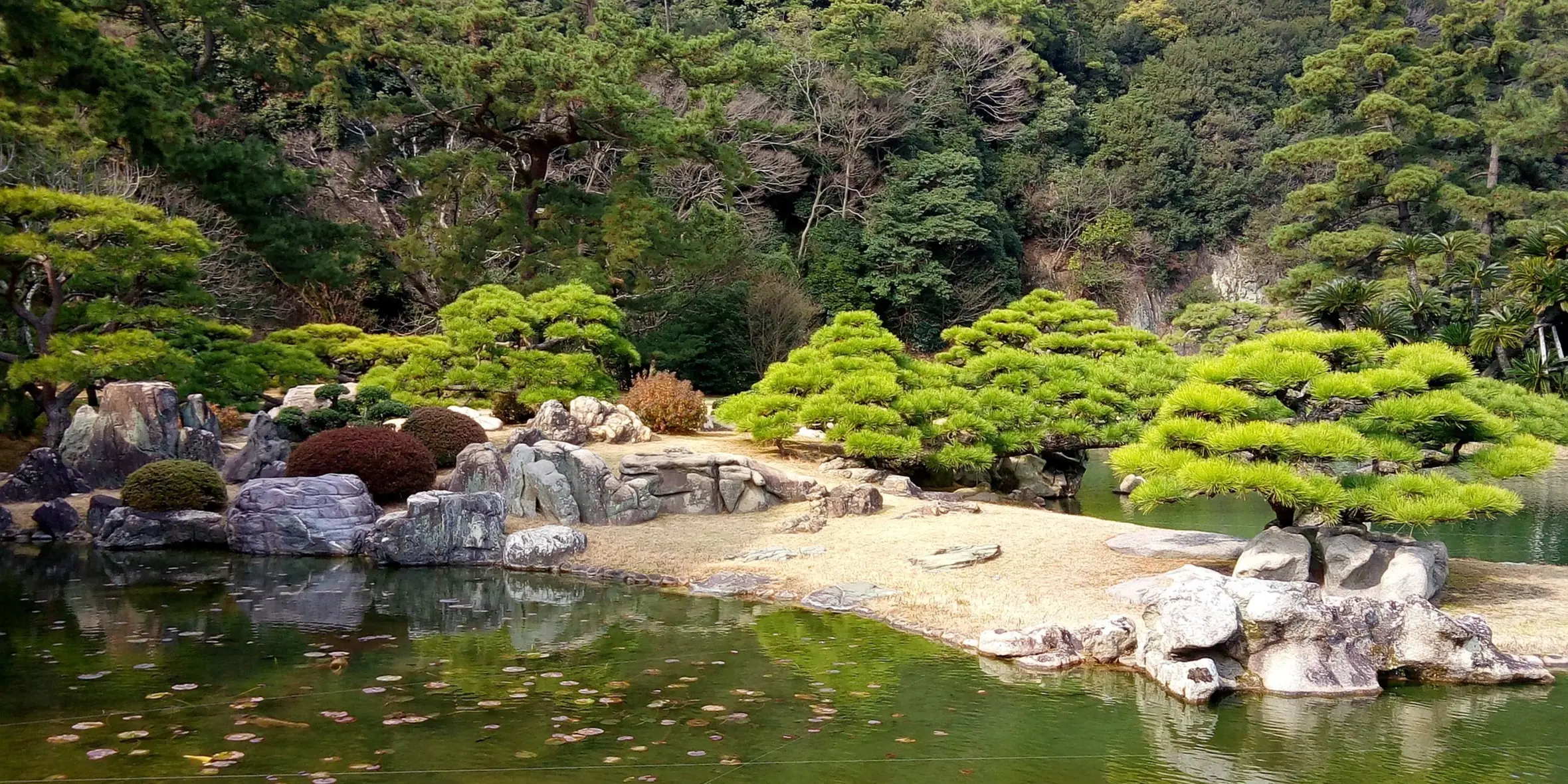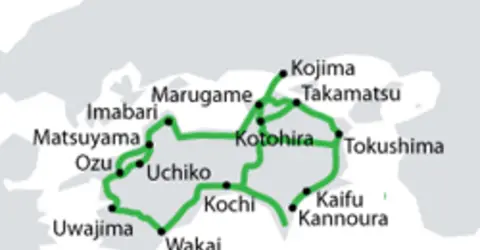All Shikoku Pass

A região de Shikoku
Shikoku é conhecida no Japão pela sua famosa peregrinação a 88 templos, que seduz através das suas paisagens de montanhas, castelos e vistas sobre o oceano. É também o centro da agricultura, e lá encontrará as melhores e mais belas frutas do arquipélago!
Coma Sanuki udon, especialidade da prefeitura de Kagawa desde a era Edo e em Agosto não perca o seu festival de Obon e as representações de Awa Odori.

Shikoku area railing network map
Kochi Prefecture
Kochi Prefecture is a largely rural area known for its natural scenery of mountains, plains, and coast. It is home to one of the most well-preserved feudal castles in the form Kochi Castle. For a sweet and charming shopping experience, the famous Sunday market has been going on for nearly centuries, evolving with the times. Along with food, artisanal goods are peddled by vendors and craftsman. A place like Kochi serves as a nice escape from larger cities in Japan.
Kochi is particularly popular with those looking for adventures in the water, as it is home to a medley of traversable rivers. Kayaking is a popular activity to engage in with both the prefecture's rivers and oceans. Diving and ferry rides are also fun adventures, and for those looking for more leisurely activities, a day whale and dolphin watching around the waters of Kochi is very popular and fun for the whole family.
Kagawa Prefecture
Kagawa Prefecture, the smallest prefecture in Japan, is home to Shodoshima, an inlet island with an array of unique features to attract travelers from all over. It was the first area in Japan to successfully grow olives, and has thus been nicknamed "Olive Island." In fact, much of the fame of Shodoshima is due to its gastronomic contributions, also well-renowned for its famous soy sauce breweries. Just like much of Shikoku, the natural attractions of Shodoshima are a major draw, and a fun presence for everyone are the wild monkeys that call Shodoshima home.
In addition, Kagawa is considered a mecca for those with an appreciation for art. Naoshima Island, right off the coast of takamatsu, is boasts some of the most well-recognized art installations in the world and garners the attention of visitors from all over the world, often times traveling to this area of Japan specifically to see what the island has on display. The most iconic of these installations is that of the spotted pumpkin created by the equally iconic Yayoi Kusama.
Tokushima Prefecture
Tokushima Prefecture is located on the Eastern part of Shikoku and is connected to Honshu via bridge. It is in this prefecture where the Shikoku Henro traditional begins with the visitation of Ryozenji Temple. In fact, more than a quarter of all 88 temples of the Shikoku Henro are located within Tokushima, so those who undergo the pilgrimage will grow very familiar with the area.
Tokushima, despite being a smaller prefecture in terms of total area, is home to the largest street festival in all of Japan in the form of the Awa Odori Dance Festival that takes place in August. Over millions of people, both within the prefecture and who travel from other parts of Japan and the world, attend and participate in the festival every year.
The area of Naruto in Tokushima is home to a number of natural whirlpools in the surrounding waters. Sight-seeing boats bring those who travel out onto the water for one of the most unique natural experiences to be had within Japan.
Ehime Prefecture
Finally, Ehime Prefecture is located on the part of Shikoku Island that rests right below Hiroshima. This prefecture is a paradise for those who love the outdoors. One of the most popular reasons for travel to Ehime is that of its cycling routes. There are nearly 30 different cycling routes within the prefecture that visitors can travel on. Definitely an interesting and active alternative to travel via bus or train (though these will all be accessible if necessary via the All Shikoku Pass).
Matsuyama City, the capital of Ehime Prefecture, is a beautiful blend of new and old. Within the city is the famous Matsuyama Castle that is particularly beautiful during the day in Spring time. From here, those who travel to Matsuyama often make a stop at the famous and historic Dogo Onsen, said to be the oldest hot spring in all of Japan. Visitors to the onsen can leisurely enjoy their time in the baths to recover and relax.
Condições do All Shikoku Pass
Elegibilidade
- O utilizador do passe ferroviário deve ser titular de um passaporte emitido por um governo estrangeiro.
※外国での永住権を持っているお客様を含め、日本国籍のお客様は使用できません。
- O utilizador do passe de comboio deve entrar no Japão como "短期滞在 (Visitante temporário)".
* O "短期滞在 (Visitante Temporário)" é um status de residência definido pela lei de imigração japonesa.
- Os clientes individuais não estão autorizados a comprar ou trocar mais do que um dos mesmos bilhetes para o mesmo período de utilização.
- É necessário apresentar o passaporte para receber um passe.
Troca
- Enviaremos o vale eletrónico para o seu endereço de correio eletrónico no prazo de 5 dias úteis após a sua encomenda. Se pretender receber mais cedo, contacte-nos. (O vale eletrónico não é o bilhete real, não é possível apanhar comboios com o vale)
- Pode imprimir um vale eletrónico em papel de tamanho A4 ou pode mostrar o vale no seu dispositivo móvel quando fizer a troca.
Pode trocar o seu voucher por um passe físico nestes locais.
- JR Shikoku Tour Takamatsu Branch, diariamente das 10:00 às 18:00 horas
- Estação de Takamatsu, diariamente das 6:50 às 20:10
- JR Shikoku Tour Matsuyama Branch, diariamente das 10:00 às 18:00 horas
- Estação de Matsuyama, diariamente das 4h50 às 21h
- JR Shikoku Tour Tokushima Branch, diariamente das 10:00 às 18:00
- Estação de Tokushima, diariamente das 8:00 às 19:40
- JR Shikoku Tour Kochi Branch, todos os dias das 10h00 às 18h00
- Estação de Kochi, diariamente das 7h40 às 19h40
- JR Shikoku Tour Umeda Branch, das 13:00 às 17:00 às quartas, quintas e sextas-feiras
- Nippon Travel Agency TiS Okayama, diariamente das 10:00 às 16:00, fechado às terças-feiras
Validade
O que está incluído no passe?
- Linhas incluídas no passe: JR Shikoku Tosa Kuroshio Railway Asa Kaigan Railway Kotoden Iyotetsu Tosaden.
O que é que o passe não inclui?
- O passe não é válido na linha Sunrise Seto e nos autocarros.
Reserva de lugares
- Com o passe, não é necessário pagar qualquer taxa adicional para reservar lugares.
- As carruagens de classe normal não reservadas podem ser acedidas livremente.
- Para viajar em primeira classe (carruagens verdes), é necessário pagar uma taxa adicional.
- Para aceder às plataformas, mostre o seu passe ao pessoal da JR Shikoku que se encontra à entrada da plataforma.
- Para reservar um lugar, pergunte ao pessoal da JR Shikoku na bilheteira.
- Trata-se de um passe pessoal. Por favor, tenha sempre consigo o seu passaporte quando utilizar o passe, pois o pessoal das estações e dos comboios poderá verificá-lo.
Condições de cancelamento e taxas
- Um vale não utilizado é reembolsável durante um ano a partir da data de emissão.
- O vale pode ser reembolsado se nunca tiver sido trocado no Japão.
- Será retida uma taxa de anulação de 15% do valor do vale.
- Não é possível o reembolso de um vale recebido por nós mais de um ano após a data de emissão.
- Não é possível efetuar o reembolso de um vale perdido ou roubado.
Perguntas Frequentes



